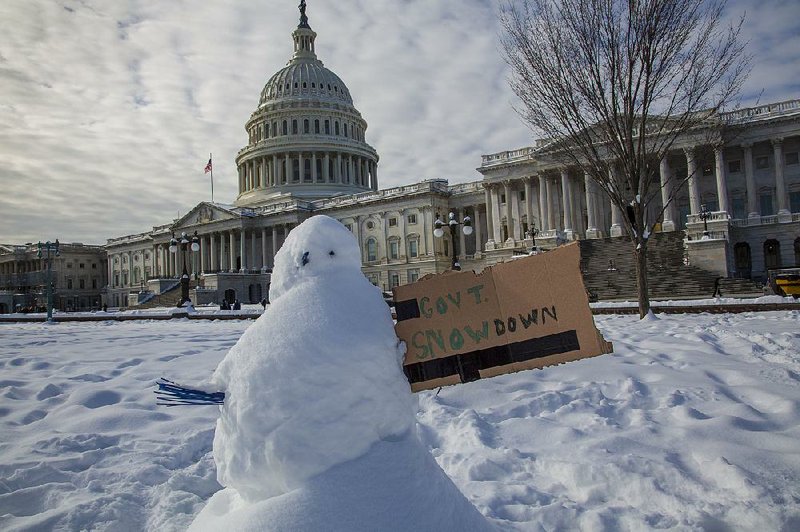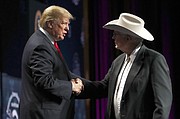WASHINGTON -- With the government shutdown in week four, President Donald Trump rejected a short-term legislative fix and dug in Monday, declaring he would "never, ever back down."
Trump rejected a suggestion to reopen all government departments for several weeks while negotiations would continue with Democrats over his demands for $5.7 billion for a wall along the U.S.-Mexico border. The president also edged further away from the idea of trying to declare a national emergency to circumvent Congress.
"I'm not looking to call a national emergency," Trump said. "This is so simple we shouldn't have to."
No cracks were apparent in the president's deadlock with lawmakers after a weekend with no negotiations. His ruling out the short-term option proposed by Republican Sen. Lindsey Graham removed one path forward, and little else was in sight. Congressional Republicans were watching Trump for a signal for how to move next, and Democrats have not budged from their refusal to fund the wall and their demand that he reopen government before border talks resume.
On Monday, Democrats issued fresh calls for Trump to allow the quarter of the government that has been shuttered to reopen.
"Why won't President Trump open the government while we continue to negotiate?" Senate Minority Leader Charles Schumer, D-N.Y., wrote on Twitter. "Because he thinks it's okay to use Americans' lives, livelihoods, paychecks, and families as 'leverage' for his wall. Stop hurting Americans and open the government now, realDonaldTrump."
Trump continued his pitch hours later in his remarks to the American Farm Bureau Federation's 100th annual convention in New Orleans, where he urged those in attendance to call Democrats in Congress and urge them to relent on the wall.
Trump also spoke at length about what he called "the crisis of illegal immigration," including the inflow of drugs and human trafficking.
"I want people to come into our country, but they have to come in legally, they have to come in through a process," Trump said.
He also said he wants to make it easier for migrant farmworkers who enter the country legally, drawing cheers from the crowd.
"For the people that work the farms," Trump said, "it's going to be easier for them to get in than what they have to go through now."
PUSHING DEMOCRATS
The effect of the 24-day partial government closure is being felt around the country. About 800,000 federal workers missed paychecks, deepening anxieties about mortgage payments and unpaid bills, and about half of them were off the job, cutting off some services. Travelers at the Atlanta airport, the nation's busiest, dealt with waits of more than an hour Monday as no-shows by security screeners soared.
Trump spent the weekend in the White House reaching out to aides and lawmakers and tweeting about Democratic foes as he tried to make the case that the wall was needed on both security and humanitarian grounds. He stressed that argument repeatedly during his speech at the farming convention Monday, insisting there was "no substitute" for a wall or a barrier along the southern border.
Trump has continued to insist that he has the power to sign an emergency declaration to deal with what he says is a crisis of drug smuggling and trafficking of women and children at the border. But he now appears to be in no rush to make such a declaration.
Instead, he is focused on pushing Democrats to return to the negotiating table, though he walked out of the most recent talks last week. In recent days, Trump seized on the fact that a group of House and Senate Democrats were on a retreat in Puerto Rico. Democrats, he argued, were partying on a beach rather than negotiating -- though Democratic House Speaker Nancy Pelosi and Schumer were not on the trip.
Trump left their session at the White House last Wednesday after Pelosi told him that she would not agree to fund the border wall even if he reopened the government. He called the meeting a "total waste of time."
White House officials cautioned that an emergency order remains on the table. Many inside and outside the White House hold that it may be the best option to end the standoff, reopening the government while allowing Trump to tell his base supporters that he didn't cave on the wall.
However, some GOP lawmakers -- as well as White House aides -- have counseled against it, concerned that an emergency declaration would immediately be challenged in court. Others have raised concerns about re-routing money from other projects, including money Congress approved for disaster aid. Lawmakers on both sides of the aisle have warned that acting under an emergency order would set a troubling precedent for executive power.
With negotiations stuck, the White House is considering reaching out to rank-and-file Democrats rather than just the leaders to see whether they can build any consensus for the wall, though it's uncertain whether any would respond. Pelosi and Schumer remain the only ones with the power to make a deal.
Trump was taking a wide range of advice on both sides of the issue, including from his new chief of staff, Mick Mulvaney; senior aide and son-in-law Jared Kushner; and Rep. Mark Meadows, R-N.C., as well as outside political advisers.
In the House, Democrats are looking to keep the pressure on Trump by holding votes this week on two bills: one that would reopen the government until Feb. 1, and a second that would reopen it until Feb. 28.
Rep. Nita Lowey of New York, the top Democrat on the Appropriations Committee, said the bills offer "additional options" to end the shutdown and would give lawmakers time for negotiations on border security and immigration.
Meanwhile, small groups of senators have started to gather on their own in hopes of finding a path forward. Senators from both parties met last week in Graham's office, and several Senate Republicans also met with Vice President Mike Pence in hopes of finding a broader deal on immigration.
So far, only three Senate Republicans -- Cory Gardner of Colorado, Susan Collins of Maine and Lisa Murkowski of Alaska -- have decisively broken with Trump and called for the government to reopen without a border wall deal. Gardner and Collins are up for re-election in Democratic-leaning states; Murkowski was re-elected in 2016.
Other Republicans are expressing their unease with caution. Sen. Joni Ernst of Iowa has put distance, if only a tiny bit, between herself and Trump by saying that while she strongly supports a wall, it does not need to cover the entire southern border. Sen. Martha McSally of Arizona has asked that her pay be withheld until the shutdown is over. Sen. Thom Tillis of North Carolina has called for Republicans to strike a deal that included "long-term security" for the young immigrants known as Dreamers who were brought to the country illegally as children. All will face voters in 2020.
VIEWS FROM THE PUBLIC
While U.S. leaders search for a way to resolve the dispute, federal workers remain in the middle.
"I am concerned for my people," said Gregory D. Blaney, an aerospace engineer who runs a NASA facility in Fairmont, W.Va., and is working without pay. But, he added, "I'm willing to endure some impact if it means border security."
"We need the wall," Jessica Lemasters, 29, an accountant on furlough from the Treasury Department, said over lunch at the Corner Cafe, a few blocks from a rally in Parkersburg, W.Va., of federal workers asking for an end to the shutdown. Lemasters said she is particularly concerned about the state's opioid crisis and believes it is related to border security. "I don't like being furloughed, but it happens," she said.
While Trump overstated the amount of opioids flowing into the nation through the southern border in an Oval Office speech last week, many see the wall as one way to stop the tide.
Eric Engle, an organizer of the rally aimed at Sen. Shelley Moore Capito, R-W.Va., took an opposing view, saying: "We need to end this shutdown. If it takes overriding the president, that's what it takes."
Information for this article was contributed by Catherine Lucey, Jill Colvin, Darlene Superville, Matthew Daly and Jonathan Lemire of The Associated Press; by Sheryl Gay Stolberg of The New York Times; and by John Wagner and Felicia Sonmez of The Washington Post.
A Section on 01/15/2019

